Delivered at the CIDOC off-site meeting during The Power of Museums (26th ICOM General Conference), Prague, 25 August 2022
I’m talking today about the Exhibition Object Data Exchange Model, EODEM, which is a project organised by CIDOC Documentation Standards Working Group (DSWG).
Our aim is very simple: to make it possible to export object exhibition data from a lender’s collections management system at the touch of a button, and import that data into a borrower’s system – produced by a different software vendor – just as easily. The process should work like this:
- We start with an object
- Which is recorded in a database
- The lender opens their Collections Management System (CMS) and finds the object’s record
- They press an EODEM export button
- And an EODEM file is created
- The lender emails EODEM file to the borrower
- The borrower receives the email and saves the file
- They open their CMS
- And press an EODEM import button
- And the object’s data is stored in the borrower’s database
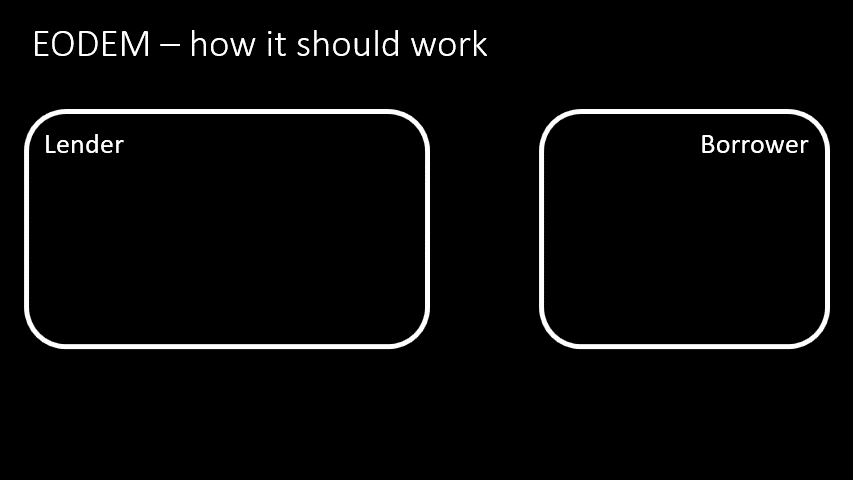
Why are we working on this?
We all know that we – or our colleagues – spend huge amount of time copying and pasting – or, worse, retyping – object information between collections management systems and forms or emails.
But we don’t know how much time, so we’ve been running a survey over the summer of 2022 to find out; today, I’ll present our preliminary findings, as of 13 August 2022. First of all I should speak about our sample. We had 42 usable results (although not everyone filled in all the questions). Because of the channels used to circulate the survey, there’s a strong geographical bias to the sample:
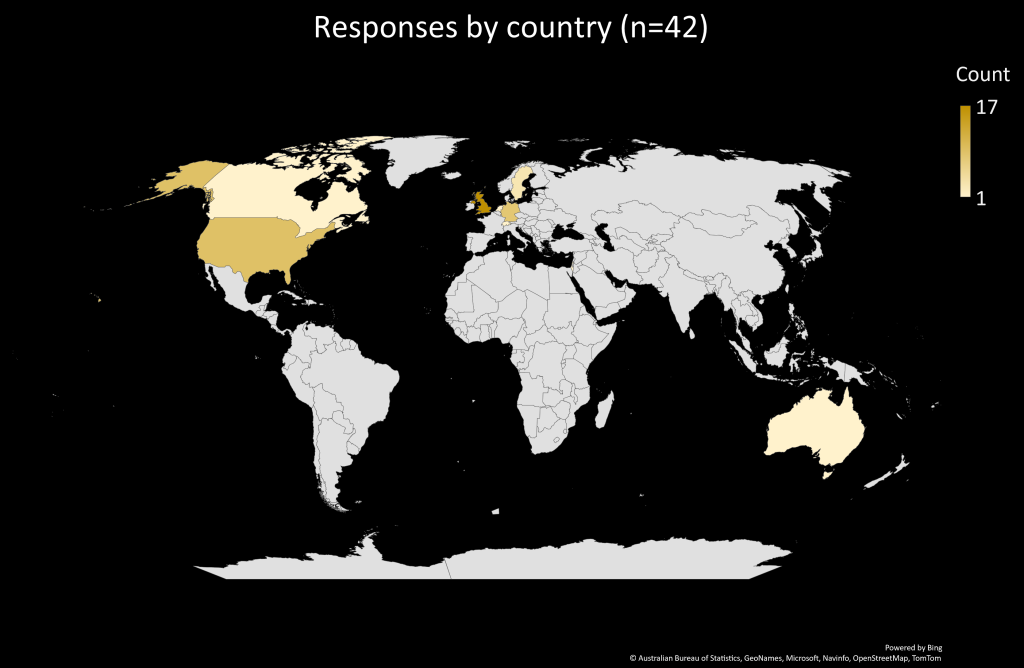
| Australia | 1 |
| Canada | 1 |
| Germany | 8 |
| Israel | 1 |
| Netherlands | 1 |
| Sweden | 3 |
| Switzerland | 1 |
| United Kingdom | 17 |
| United States | 9 |
- 40% of responses came from the UK
- Around 20% each came from Germany and the United States
- The remainder were distributed between a further 6 countries
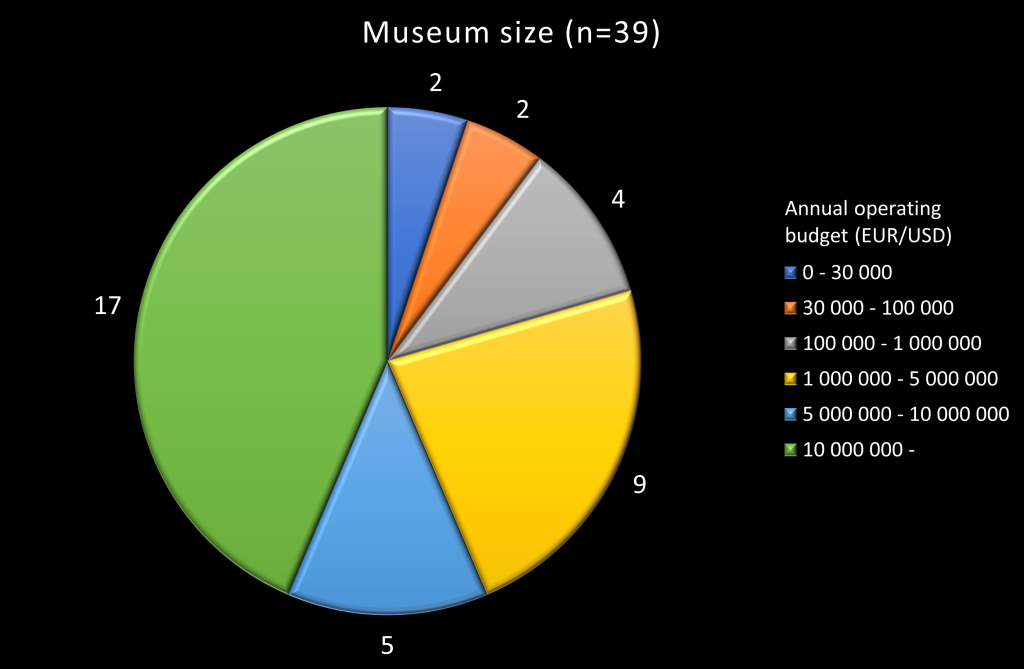
As we might expect, nearly half our responses came from the largest museums – indicated by an annual operating budget of more than 10 million Euros or US dollars; and nearly 80% of responses came from museums with budgets greater than 1 million Euros or dollars.
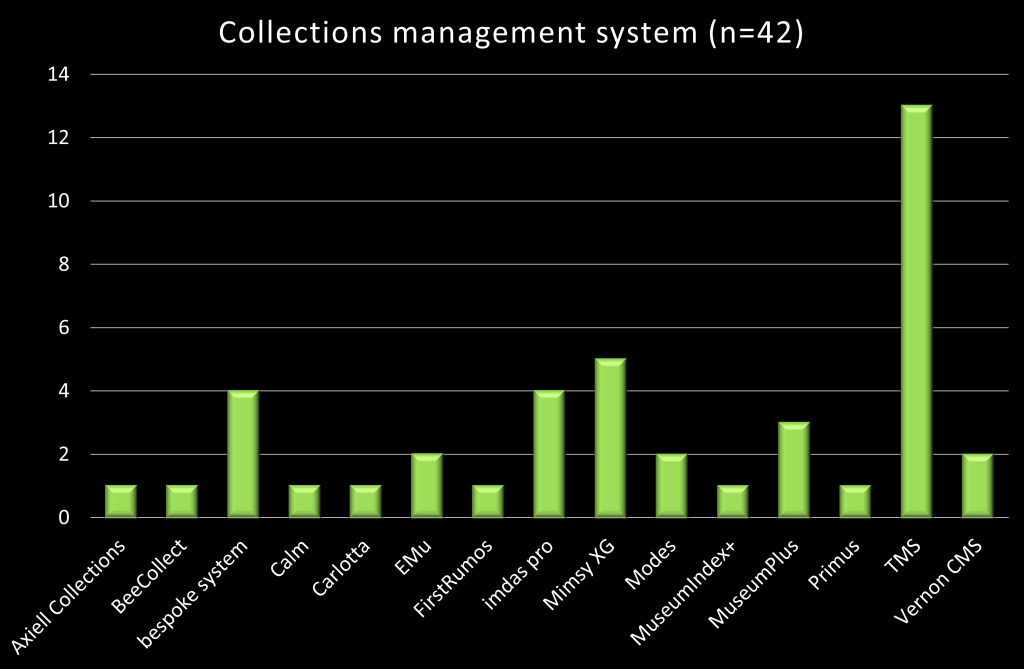
Again, due to the channels available to us, there’s a strong bias towards users of the TMS collections management system in the sample: they make up 30%. Next are Mimsy XG users, followed closely by users of imdas pro and (perhaps worryingly?) bespoke systems. It’s worth noting that if we lump all Axiell users together they account for 17% of responses.
Now on to the meat of the survey: how many objects do museums lend or borrow every year?
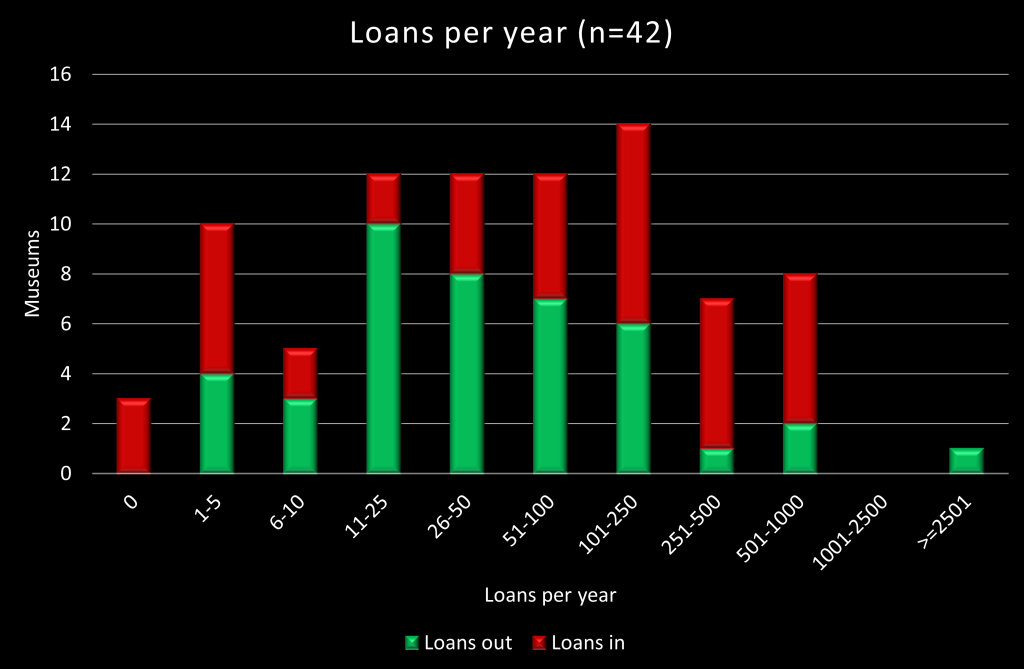
| Loans out | |
| minimum | 2 |
| median | 31.5 |
| mean | 166 |
| maximum | 3000 |
| Loans in | |
| minimum | 0 |
| median | 92.5 |
| mean | 194 |
| maximum | 750 |
On the chart, I’ve grouped the number of objects lent per year into bands – it’s important to note that the scale along the horizontal axis is not linear. The bars show the number of museums which fall into each band: green for loans out, red for loans in. There’s a clear bias towards museums lending more objects than they borrow. Generally, for both loans out and in, the majority of museums lend or borrow fewer objects, whilst a few museums lend or borrow significantly more – so the medians for both types of loan are significantly less than the means: a medium of 31.5 objects lent and 92.5 borrowed, compared to a mean of 166 lent and 194 borrowed. But do bear in mind the maximums: 3,000 objects lent and 750 borrowed.
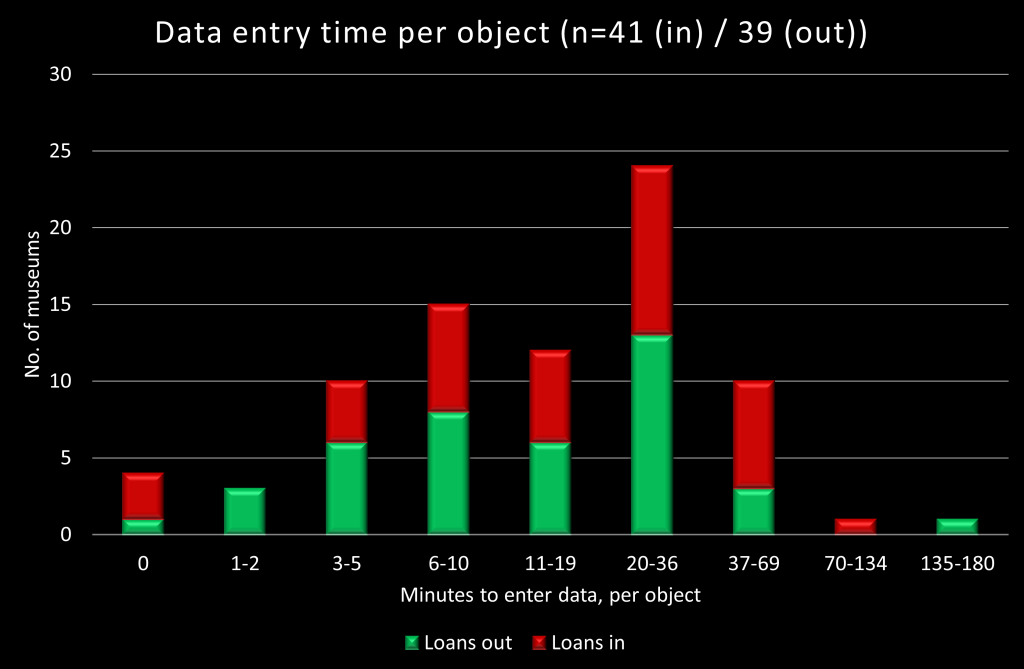
| Loans out | |
| minimum | 0 |
| median | 15 |
| mean | 22 |
| maximum | 180 |
| Loans in | |
| minimum | 0 |
| median | 17.5 |
| mean | 25 |
| maximum | 120 |
But when it comes to the time spent on data-entry, the differences are reduced, with medians of 15 and 17.5 minutes per object for loans out and in, compared to means of 22 and 25 minutes for loans out and in. (We shouldn’t be surprised to find that loans out take less time, as lenders can often export the data from their collections management system directly into reports.) We do have two quite worrying maximums, of 3 hours per object for loans out, and 2 hours per object for loans in. But despite these two outlying values, the burden generally falls on the borrowing institution.
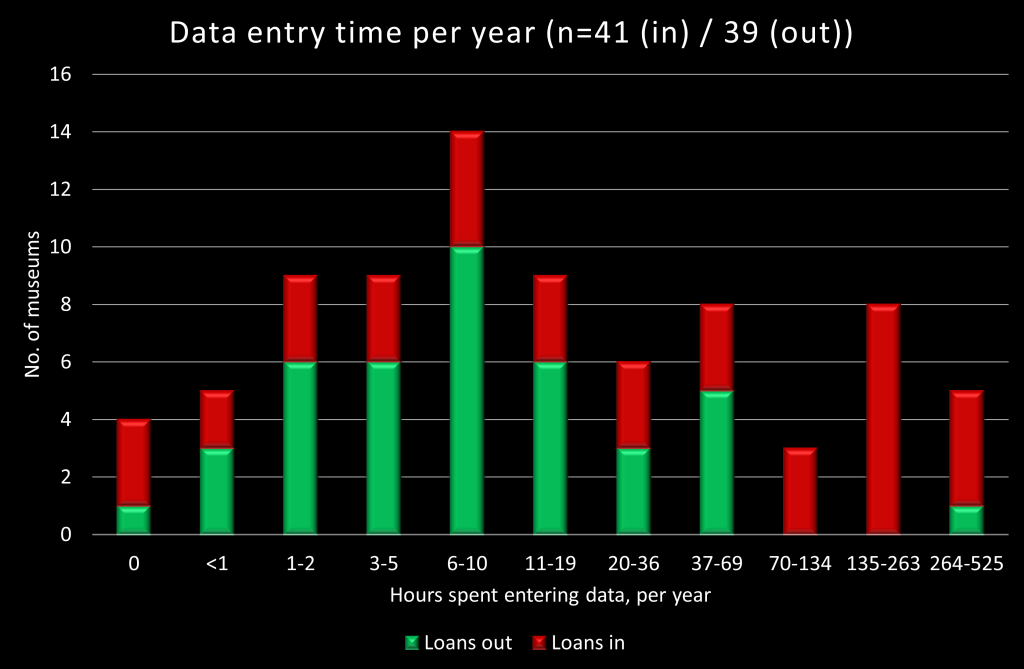
| Loans out | |
| minimum | 0.00 |
| median | 8.33 |
| mean | 23.28 |
| maximum | 375.00 |
| Loans in | |
| minimum | 0.00 |
| median | 33.33 |
| mean | 85.02 |
| maximum | 525.00 |
When we look at the time spent per year on loan–related data-entry, shown here in hours, then that difference become quite obvious: the median for loans out is 8 hours 20 minutes per year, for loans in it is 33 hours 20 minutes. Once again, a few institutions report much longer times, which gives us means of 23 hours 15 minutes per year for loans out, and 85 hours for loans in – and maximums of 375 hours for loans out and 525 for loans in.
Let’s focus on those figures for loans in, and convert them into days spent on data entry over a 10-year period. We’ll assume that staff spend a full 7 hours a day on data-entry, this gives a median time spent on data entry for loans over a ten year period of 48 days, and a mean of 121 days – over half a working year. And in the case of one institution, loan-in data entry would take 750 days: nearly 3.5 working years. I won’t try and convert these figures into salary costs – there are too many variables – but it’s clear that there’s a significant potential to make long-term savings if we can automate loan-related data entry.
How are we doing this?
The EODEM project evolved during a series of CIDOC conferences. It began with a discussion between Rupert Shepherd, Jonathan Whitson Cloud, and Norbert Kanter of Zetcom at the CIDOC awayday, during the 2016 ICOM Triennial at Milan. In Tbilisi in 2017, the CIDOC Documentation Standards Working Group held a workshop with documentalists, to identify the units of information that would be needed for an exchange of exhibition data. The following year, 2018, in Heraklion, at a round table discussion with various software vendors, we agreed that the project was doable, and produced the first draft of the EODEM data profile. The project stalled in 2019, and then, as we reconvened in early 2020, Covid hit; so we have been working as a small group meeting online, including online presentations at both the 2020 and ‘2021’ CIDOC Conferences, where we held workshops for system developers, discussing some of the potential problems or questions that might arise during the development process.
Our regular meetings include representatives from the DSWG and several software vendors (some of whom are just discussing the standard – not all the vendors are implementing it just yet). Other developers receive notes from meetings.
Over the last two years, we’ve been focussing on the creation of a final data profile, comprising:
- A final list of units of information;
- An agreed data standard with which to encode the data and a file format in which to transfer it; and
- Documentation to support the integration of the standard with software systems.
For our data standard, we have settled upon CIDOC’s standard for Lightweight Information Describing Objects (LIDO). We are using the new version, 1.1, released in December 2021. This means that, if a collections management system can already export or import LIDO data, it’s already very close to being able to handle EODEM data, too.
This decision also chose our file format for us: LIDO uses the long-established and highly-flexible eXtensible Markup Language, XML.
After much discussion, we’ve settled upon a set of units of information which we feel are useful, without being too extensive. Because of the way LIDO requires them to be grouped, there are 109 in all. I doubt any collections management system has fields for every one of these; never mind a museum having data for all of these fields. But this is not a problem, because EODEM works on the principle that anything is better than nothing, and so the only mandatory units of information where we insist that a museum provide data are:
- Object Type
- Title or Name
- Object ID
- Record Type – whether it represents a single object or a group
(There are a few more units of information where we expect that the collections management system will add data from system values or when it’s exporting a record, such as Title Type or Title Language, although these could equally be actual data held in the system.)
Obviously, we hope that museums are able to provide more data, and that collections management systems will be able to export or import into more fields – but this is all that’s required to provide an EODEM record.
Where are we now?
We’ve spent the last months establishing EODEM as a formal profile of LIDO; Richard Light has very kindly been doing the bulk of the work. EODEM will be the first formal LIDO profile to be implemented within an integrated technical framework, which takes the form of
- A single XML document, which contains:
- A description of EODEM in the form of changes to the LIDO XML Schema
- Human-readable documentation of the EODEM profile
- This single document can then be used to generate:
- An XSD schema file to validate EODEM LIDO records
- Human-readable documentation in HTML,
- and in PDF, comprising a list of units of information and how to extract them from the EODEM document, helping developers query documents for import
- An HTML outline of an EODEM document’s structure, helping developers construct documents for export
- We also have a sample EODEM document with real-world examples,
- And we have an XSLT file embodying a set of Schematron rules to provide richer validation (and more useful failure messages)
We think that these are far enough developed, and sufficiently mature, for us to have launched the current release of the EODEM profile, version 0.08, as a public beta at the CIDOC conference in Tallinn in May 2022.
Software developers now have access to the resources I’ve just described, as well an online viewer to preview LIDO records. We can also demonstrate proof of concept importers and exporters for an EODEM record in MuseumPlus and Modes. (And here, I’d like to say a particular thank you to Jette Klein-Berning at Zetcom, and Richard Light, formerly of the Modes Users Association, who have been doing the bulk of the heavy lifting when it comes to XML processing.) We still need to update a small set of sample tools and templates to show developers how to work with the raw XML file.
What’s next?
The next stage is to test the beta profile by actually trying to develop importers and exporters. We hope that as many system vendors as possible will do this, and tell us how they get on. So far, we already have nine software suppliers on board.
| Company | Product | Exporter | Importer |
|---|---|---|---|
| Axiell | Axiell Collections, Mimsy XG | under development | under development |
| Axiell / Musoft | Museion | under development | possibly |
| Gallery Systems | TMS | planned | under development |
| Knowledge Integration | CIIM | planned | no |
| KulturIT | Primus, DigitaltMuseum | under development | under development |
| Modes Users Association | Modes | under development | under development |
| Sistemas do Futuro | in arte, in patrimonium | planned | no |
| Userix Oy | Collecte | planned | possibly |
| Zetcom | MuseumPlus | under development | under development |
All nine are already either developing, or planning to develop, an EODEM exporter – and four are working on an importer, too. Once we have reviewed and incorporated developers’ initial feedback, we will be ready for a stable release of EODEM Version 1, which we hope to be able to announce this autumn, perhaps at the European Registrars Conference, or this winter.
So, what resources are available to help you work with EODEM? You can find links to all necessary files at the project’s home page on the CIDOC website; this also includes:
- A list of Frequently Asked Questions
- Links to previous presentations on EODEM
- A list of software suppliers who are currently implementing EODEM
And we have an online viewer which will allow you to preview EODEM files.
If you want to get really involved, you could join our monthly meetings – just let me know via my website. But the key step you can take, if you think EODEM is a worthwhile initiative, is to ask your collections management system supplier to incorporate it into their system.
And why should you, as a documentalist, start asking your supplier to introduce EODEM?
- It will save you and your colleagues time, which you can use for more rewarding tasks than copying and pasting data
- It will improve data quality – there’ll be fewer typos or copy / paste errors, and the system will automatically put data into the correct database fields
- It will help you show your colleagues how the collections management system (and international standards!) can help them do their work
And did I mention that it’ll save you time?
If you go to the EODEM website, you’ll also find a link to the survey. Our sample is still small and un-representative, so please do go away and fill it in if you haven’t done so already (if you have: thank you!) – and ask all your contacts to do the same. We plan to report revised findings in a webinar organised by Collections Trust on 13 October, and again at the European Registrars Conference in November.
